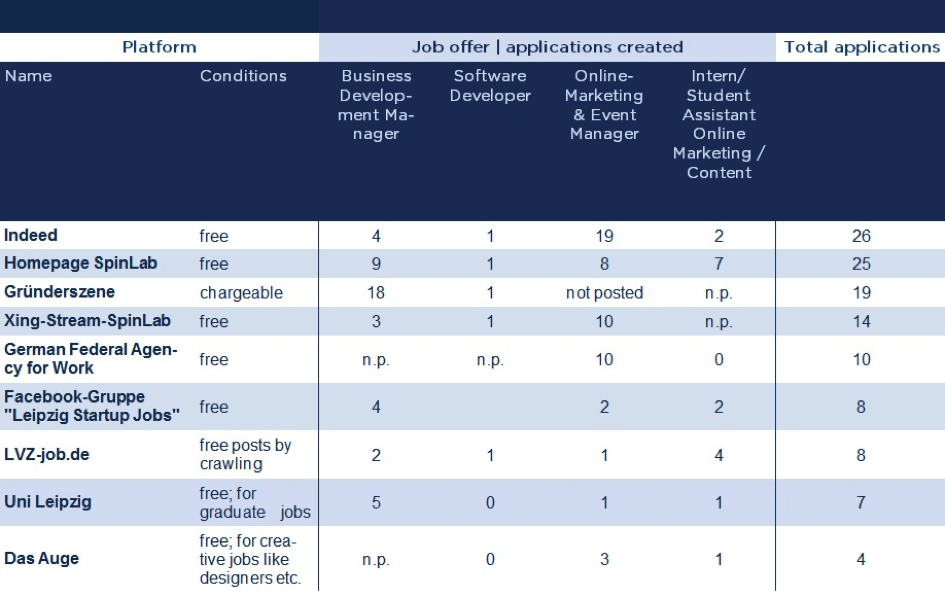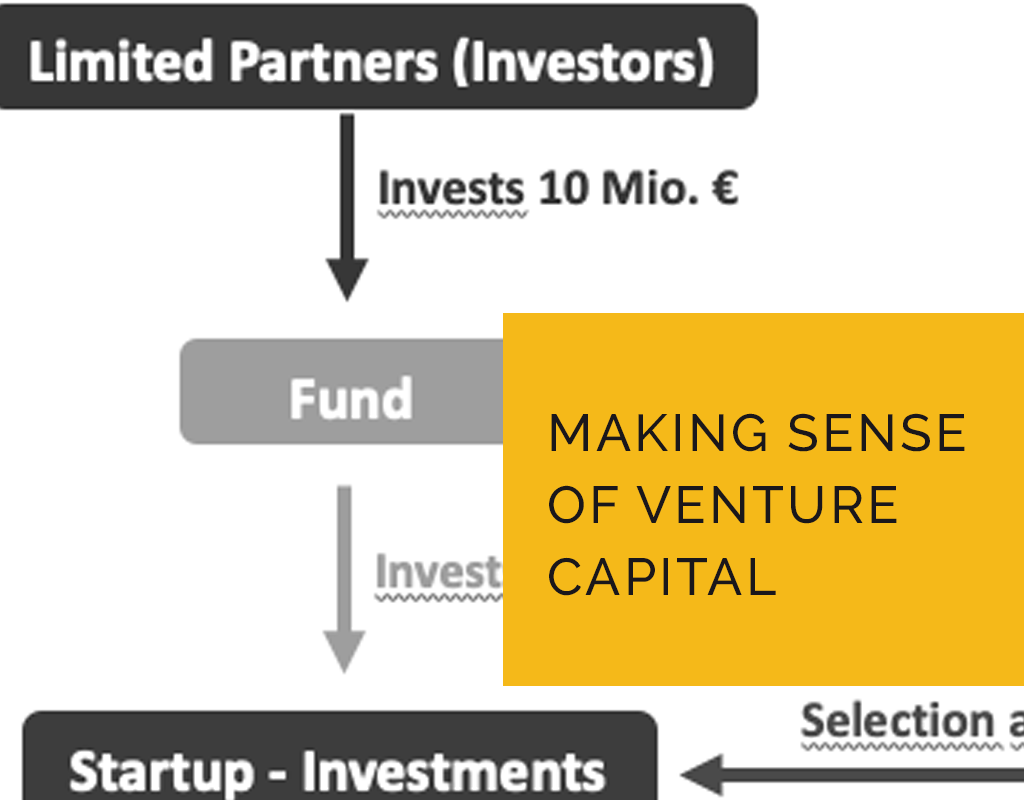A highly-motivated and skilled team is one of the most important factors for a startup’s success. However, finding new employees can be a time-consuming and an expensive procedure. Here at the SpinLab, we try to support our young and upcoming portfolio-companies in the best ways possible. In the recent months, we have learned a lot about recruiting for entrepreneurial companies as we published 4 different job offers on a huge amount of platforms, talked to several founders and asked them about their recruiting processes, and lastly we also read some nice scientific articles on the topic.
We finally feel wise enough to share our valuable lessons-learned with you to help you optimize your future recruitment processes in order to save valuable time for other issues of your businesses. The following article is intended to give you advice on how to handle recruitment processes in startups generally and especially on how to arrange your job offer and which job-platforms to use. Moreover, it’s also supposed to motivate applicants to apply for jobs in young entrepreneurial teams.
Without further ado, here's the 6 things we've learned in the SpinLab with recruiting
1. Startups’ pains and issues on their way to good employees
It’s never easy for startups to win good employees when they must compete with huge companies superior in reputation, level of awareness, payment and resources for recruiting. As Stephan Schleuss, founder of Wundercurves, a startup taking part in our current 4th SpinLab class, points out it was quite hard for them to find applicants at the beginning. In his opinion it’s a challenge for smaller and unknown startups or young companies that don’t take part in a more known accelerator- or incubator-program to find qualified employees. They simply can’t stand out from other startups or companies that can pay more as they’re bigger and better equipped.
Martin Jaehnert, founder of binee, a startup that took part in the 3rd SpinLab program and is now settled in Spin Office just two doors away, reports that they already have several applications for their currently vacant position as a “Communication Enthusiast”. Still it’s not easy to find the right person as several factors need to add up. As an intern or employee is always an investment of time and money, Martin and his team spend much time to carefully choose the right people. Publishing job offers themselves is quite time consuming, that’s why they benefitted from the SpinLab applicant pools, as Martin explained.
Alexandra Hucke, founder of Merolt, a SpinLab alumni that joined the program from February till July 2015, says that finding new employees for sales and development is especially hard for them. In the end they could only get developers through personal contact, direct approach via Xing, and recruitment agencies. Their job offers on several free and chargeable job platforms weren’t successful in this case, but finding a developer with special skills you need for your company is hard anyway, whether you’re a startup or an established company, as Alexandra Hucke and her college Aline Kniestedt assume. It was much easier for Merolt to find Sales-employees though their qualifications vary a lot. According to their experiences it’s always quite easy to find employees for any job in the area of Online-Marketing – A statement that is highly supported by the later shown results of our experiment. As Aline from Merolt points out, it’s tough for startups to find suitable employees in any case as you need special types of people. Working in a startup is not a “9 to 5 obligatory job” as Aline tells, but you need a special attitude, you need to bring in the required skills and you need to fit in the team – all in all a tough challenge for startups to find the right employees.
2. How Startups should arrange their job offers
Still working in a rather small startup can also have many advantages over working in a big company. In startups you can e.g. profit from a highly-motivated team, open-mindedness towards changes, and innovation or high promotion prospects. For Stephan Schleuss, founder of Wundercurves, working in a young company means an incredible learning opportunity as you have much more responsibility. He even compares startups to bootcamps. Someone who really wants to learn and develop further will find it difficult to work in a company and do exactly what has been done before in their previous locations of employment. Startups need people who search for high responsibility, for a steep learning curve, for ‘making something big’ and these are usually not those people who want to work in a group.
And these characteristics of working in a startup – advantage for some, disadvantages for others - should be emphasized by startups on their search for new employees. Don’t try to keep up with BMW or Siemens, refer to your own strengths that might lie in totally different areas. But you need co-workers who share your spirit and ideals anyway so what’s the matter with all the others? After having interviewed several founders I came more and more to the insight that startups are actually not competing with bigger, more established companies. They simply are fishing in different waters. They don’t search for well-adjusted people following the routines of their predecessors. They need highly-energetic, motivated people, who want to shape the entire world – or at least the future of a small company that will hopefully (!) soon shape a preferably big (!) part of the world.
"Startups and big companies do their fishing in different waters."
But how can you reach so many and ideally the fitting applicants already with the arrangement of your job offer? Tumasjan, Strobel, und Welpe did a survey most. They interviewed 160 students and graduates and found out that team climate is the highest valued characteristic startups can offer job applicants.
As second most valued characteristic, the authors identified responsibility/empowerment, meaning that potential employees appreciate having individual responsibility at their workplace. Flexibility of working schedule proved to be the third most valued characteristics by potential startup-applicants together with the opportunity to take on leadership functions, a steep learning curve, a flat hierarchy and the gaining of entrepreneurial knowledge.
As a result, these characteristics should be especially emphasized in startups’ job offers to find suitable employees and to stand out from big, established companies that might offer higher salary and more security but can’t compete at these points. Wundercurves is already doing a great job in their job advertisement. The E-Commerce-Startup offers an online platform for plus-size fashion and is currently looking for an intern in Online-Marketing.
Find this job offer and many like it at http://www.spinlab.co/jobs.html
3. The payment issue
As already mentioned, young startups will usually not be able to provide salaries comparable to bigger and more well established companies. So how should you communicate this fact in your job offer? Our general advice is easy but effective: be honest. Future-employees might be satisfied with less payment if they know the company simply can’t afford more and the founders are also struggling to pay their rent. But giving them the feeling of being abused as cheap employees will make their commitment melt away pretty fast.
So in the end you’re doing yourself a favor by revealing your financial situation from the start, at least if you’re planning long-term employment. Otherwise you waste a lot of time with applicants you can’t afford or who don’t fit in your company anyway. Still you should keep in mind that your willingness to pay and other conditions might vary depending on the qualifications your applicants’ posses. So sometimes it can be helpful to leave some negotiating space.
Being honest is also the leading strategy for binee. The small startup hasn’t got an investment yet and therefore can’t pay new employees in a usual way, a fact that they communicate quite openly not to foster false expectations. They hire new employees as interns at the beginning with the prospects to stay in the company either paid by future investments, a sponsorship or company shares in case they become co-founders. Even tough not every intern can become an employee later on, an internship at binee is quite exciting as in this young company you can experience a lot and partly influence binee’s future development, as Martin points out.
So finally the missing payment can be compensated to a certain extent by other benefits startups offer their employees. But still these benefits must be communicated in the right way and as soon as possible to avoid a waste of time for startups and applicants. The more precisely you mention the payment issue – and actually every characteristic concerning your company - in your job offer, the less inappropriate applicants you will get.
4. On which platforms Startups should publish their job offers - The experiment
The last months my college Matthew McDermott, responsible for Innovation & Business Development at SpinLab and I, Student Assistant at SpinLab, started an experiment on job platforms. We published 4 job offers on more than 60 platforms and generated more than 140 job postings altogether. Checking conditions and response rate we evaluated the platforms and their suitability for startups. We published a job as Business Development Manager, Software Developer, Online-Marketing- and Event-Manager and Intern/Student Assistant in Online-Marketing & Content. All these job offers were collective ones meaning that we searched applicants for several startups of our SpinLab-Network. We collected the documents of all applicants and sent them to the HR managers of all our portfolio-startups. In case they were interested in getting to know one of the applicants they got a short introduction via mail.

As shown in the table above, the most successful free platforms were our Homepage (http://www.spinlab.co/jobs.html) and Indeed (http://de.indeed.com/). Our posts on Gründerszene also created several applications but posting on this platform costs at least 149 € - a price not every small startup is willing to pay. What seems pretty useful is to provide your job offer with certain fitting (!) key words as many applicants reported they found the offers on our homepage via Google-Search. Posting your job offer on Social Networks on Social Networks like Xing or Facebook is also worthwhile and not a big effort. Based on our response-rates we especially recommend the group “Leipzig Startup Jobs” for Leipzig with almost 750 members (current status 30th Oct. 2016). Another popular Facebook-group for startup-job-postings in Leipzig is "Startupszene Leipzig" with more than 2.200 members (current status 30th Oct. 2016).
It’s not mentioned in our table as our response rates were rather low, but it’s still worth a try. We’d also recommend posting your job offer on platforms of universities – we especially had great experience with the platform of University Leipzig (http://www.jobportal.uni-leipzig.de). Students quite often search for jobs as student assistants or internships or even for a suitable career start when they graduate. Before they acquire jobs from bigger companies companies and become too lazy to quit again you should convince them of your business vision and opportunities. Based on our results we also recommend posting on the German Federal Agency for Work (https://jobboerse.arbeitsagentur.de/). For creative jobs in especially online-marketing or graphic or media-design we’d also advise you to check out das Auge (https://dasauge.de/).
As you may have already noticed, there’s lots of cooperation taking place between different recruiting platforms. So after having posted your job offer on some different platforms it might soon appear on even more platforms you never posted in on. In our case, it even appeared on several chargeable ones though we never paid for it! For example all of our job offers appeared on http://www.lvz-job.de/ and generated quite a few applications.
Usually a post on this platform costs at least 249 € and we got all postings for free! In the beginning it might feel a bit strange to lose control over your postings but finally you can only profit from more publicity and more applicants – so let go and let the crawling-machines do the work for you. It’s always good to find the fitting platform for your job offer concerning the field of activity but also the employment status. Putting too much effort on this isn’t worth it based on our results.
One last thing to mention that arises from the table quite easily is that your response rates are highly dependent on the kind of job offer. Finding an Online-Marketing-Manager or a Student Assistant in this area appeared to be quite easy whereas Software Developers, as mentioned above, are lesser in response rates.
Therefore we, the SpinLab, are currently working on solutions to give our startups more support in finding suitable IT-employees. You will soon have the pleasure of reading a blog article on this topic.
5. The results of our experiments or the act of pairing off
Finally, we are very glad that we could help some of our startups find suitable employees and some applicants to find an exciting job in a highly-motivated and friendly team. We are very glad to announce that so far our portfolio startups have hired five interns, two fulltime employees, and one freelancer out of our employee-pools. Also worth mentioning, is that the SpinLab hired a new full-time employee in Online-Marketing and Event-Management as well. The amount of job interviews created through our pools was much higher but unfortunately it’s not always a perfect match. As some of the applicants our portfolio-startups interviewed pointed out, the opportunity of working in a startup that joins the SpinLab program was a special enticement for them.
6. Our Five golden Recruiting-Rules for Startups
Since founders and Startup-employees are usually quite busy, we summarized our most important lessons learned for startups’ recruiting processes in the following 5 rules:
- Emphasize your unique startup-characteristics in your job offer.
- Be honest about your payment opportunities from the start.
- Post your job offers, especially on Indeed, the SpinLab-Homepage (in case you’re taking part in our program), Facebook-groups, Xing, and the German Federal Agency for Work.
- Try to catch students & graduates through university job platforms
- Buy a foosball table for your office – Great employees will come by themselves.
Outlook - Our dream of an Applicant-Pool for our Startup community
When startups search for new employees they can usually only hire one applicant. What happens to all the other well-qualified applicants? They have to apply for a different job, a different company has to publish a new job offer, or the applicants have to prepare their application documents and so on. All in all, hiring new employees and finding a new job can be very complicated and time-consuming. Therefore we want to strengthen the exchange of skilled applicants between the startups in our network. What we already tried with our collective job offers is making these processes easier for sides, startups and applicants. With only one job offer we collected well-qualified applicants (based on startups’ feedback) for all of our 24 portfolio companies. With only one application, applicants were invited to up to three personal interviews.
To simplify this process even stronger we are now having a platform developed, a platform for applicants where they can place their application documents and apply for certain jobs in the SpinLab portfolio-startups but also unsolicited. In case they are not hired, applicants get the offer to be included in our general pool so other interested startups can contact them. We are quite sure that we can help our startups and future applicants with this tool, but first it needs to be finished and launched. Even after its launch we will still depend on the startups´ constant feedback to optimize this platform so we may develop it into an instrument that can really optimize future recruiting-processes.
We truly hope that you enjoyed reading this article and that our findings via this experiment. We would be very glad to help startups in Leipzig and everywhere else to shape their recruiting-procedures more efficiently; and we’d love to motivate more people to apply for a startup job in the future – in case they are motivated to take a certain risk in exchange for an incredible experience. Got any of your own tips that make recruiting easier as a startup, or something on your mind we didn't address in the article? Then let us know in the comments below!






/RootCamp_Logo-Ecosystem.png?width=200&name=RootCamp_Logo-Ecosystem.png)
/Bitroad_Logo-Ecosystem.png?width=200&name=Bitroad_Logo-Ecosystem.png)



/White%20Versions/stadt_leipzig_white.png?width=130&name=stadt_leipzig_white.png)
/lfca_white.png?width=119&name=lfca_white.png)

/White%20Versions/sachsen_signet_white.png?width=65&height=79&name=sachsen_signet_white.png)